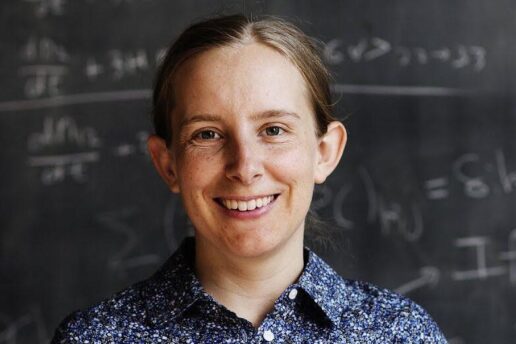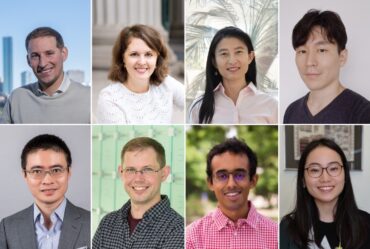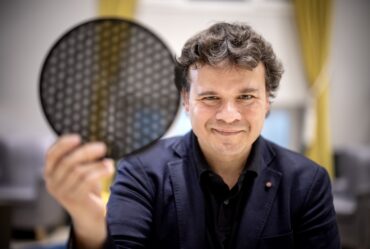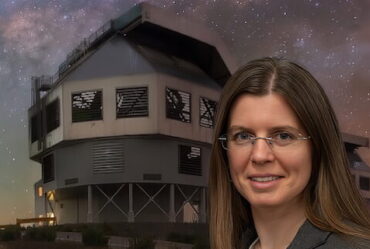
Tracy Slatyer named 2024-25 Harvard Radcliffe Institute Fellow
Contact: Mac Daniel
Associate Director of Communications
Harvard Radcliffe Institute
mac_daniel@radcliffe.harvard.edu
857-303-0205
CAMBRIDGE, Mass. (May 10, 2024)—Harvard Radcliffe Institute today announced its historic 25th anniversary class of fellows, marking a quarter century of pathbreaking interdisciplinary study.
A yearlong Radcliffe fellowship provides recipients the rare opportunity to pursue ambitious projects in the unique environment of the Institute. Each fellowship class is drawn from some of the most thoughtful and exciting contemporary scholars in the humanities, sciences, social sciences, and arts—along with writers, journalists, playwrights, and other distinguished professionals. This year, Radcliffe accepted just 3.3 percent of applicants for the 2024–2025 fellowship class.
The work that the incoming fellows will undertake reflects our times:
- Using AI to diagnose inefficiencies and biases in judicial systems
- Preparing for an emergent epidemic in substance abuse disorders in women and girls
- Using the James Webb Space Telescope to reveal cosmic history and predict the formation of dark matter
- Drawing on over a decade of research on Martin Luther King Jr. to write a book that will shed new light on King’s political philosophy
“As a former fellow and dean of the Institute, I know firsthand the impact that a Radcliffe fellowship can have. In the current moment, I have never felt more certain that Radcliffe’s approach—its embrace of interdisciplinary research and discourse across difference—is crucial to generating transformative art, scholarship, and writing” said Tomiko Brown-Nagin, dean of the Radcliffe Institute for Advanced Study, Daniel P.S. Paul Professor of Constitutional Law at Harvard Law School, and professor of history in the Faculty of Arts and Sciences. “This talented class of fellows promises to do great things that will deeply impact how we live in today’s world.”
This year’s Radcliffe fellows will be part of a unique interdisciplinary and creative community that will step away from routines to tackle projects that they have long wished to move forward. Throughout the academic year, fellows convene regularly to share their work in progress with the community and public. With access to Harvard’s unparalleled resources, Radcliffe fellows develop new tools and methods, challenge artistic and scholarly conventions, and illuminate the past, present, and future. Alumni are quick to say it was the best year of their career.
The incoming 2024–2025 fellowship class includes the following fellows:
Theo Anthony, the Mildred Londa Weisman Fellow and a Radcliffe-Film Study Center fellow, plans to spend his year working on a feature-length documentary about water management in Chicago. The film navigates the tension between our current climate crisis and “the eternal truth” of a changing climate throughout Earth’s history, told through a detailed case study of Chicago’s Deep Tunnel Project. Anthony is a filmmaker from upstate New York whose work has won awards at the Sundance Film Festival. Anthony’s Rat Film premiered to critical acclaim at Festival del film Locarno and had a broadcast premiere on PBS’s Independent Lens in 2018. His follow-up, Subject to Review, produced for ESPN’s 30 for 30 series, played at the 2019 New York Film Festival and was broadcast nationally later that year.
Daniel L. Chen, the Evelyn Green Davis Fellow and a professor at the Institute of Advanced Study at the Toulouse School of Economics in France, will continue his research into using artificial intelligence to diagnose inefficiencies and biases in judicial systems. Using data from courts worldwide, Chen is working on a book that will provide a comprehensive analysis covering predictive analytics for identifying judicial bias, field experiments on enhanced court efficiency, and insights into human interactions with AI, all aimed at strengthening justice and the rule of law.
Shelly F. Greenfield, the Mary Beth and Chris Gordon Fellow, a professor of psychiatry at Harvard Medical School, the Kristine M. Trustey Endowed Chair of Psychiatry, and chief academic officer at McLean Hospital, will explore a narrowing gender gap in the prevalence of substance use disorders over the past three decades. These include alcohol, opioids, and cannabis, with rising rates in women and girls across race, ethnicity, and lifespan and resulting in serious substance-related health and social consequences, all exacerbated by the COVID-19 pandemic. Greenfield’s research will not only examine this trend but also explore the lack of gender-specific treatment for girls and women and seek policy solutions to overcome barriers to prevention and treatment.
Jodi Schneider, the Perrin Moorhead Grayson and Bruns Grayson Fellow, will examine how social media and hyperpolarized sources of news are contributing to a widespread distrust of science. The project will culminate in a series of articles showing how social media impacts fact formation, comparing partisan news systems that amplify versus self-correct and envisioning how to improve the resiliency of online networks in overcoming information disorder so we can all agree on facts. Schneider is an associate professor of information sciences at the University of Illinois Urbana-Champaign, where she directs the Information Quality Lab. She studies the science of science through the lens of arguments, evidence, and persuasion.
Tracy R. Slatyer, the Edward, Frances, and Shirley B. Daniels Fellow and a theoretical physicist who works on particle physics, cosmology, and astrophysics, will research the mysterious nature and interactions of dark matter by studying the possible signature of new physics in astrophysical and cosmological data. She was the co-discoverer of the giant structures known as “Fermi bubbles.” These gamma-ray structures emerge above and below the center of the Milky Way and span a total length of about 50,000 light-years.
Jonathan Sterne, the William and Flora Hewlett Foundation Fellow and James McGill Professor of Culture and Technology at McGill University, is concerned with the cultural dimensions of communication technologies. One of his major ongoing projects has involved developing the history and theory of sound in the modern west, which he will bring to his work at Radcliffe. He will undertake an integrative study of the cultural politics of machine-learning systems that process, analyze, or produce sound. His work brings sonic AI more fully into the conversation in critical AI studies and interdisciplinary media studies.
Brandon M. Terry, the Joy Foundation Fellow, John L. Loeb Associate Professor of the Social Sciences at Harvard University, and codirector of the Institute on Policing, Incarceration, and Public Safety at the Hutchins Center for African and African American Research, will work on a book about Martin Luther King Jr.’s political philosophy and ethics, based on over a decade of teaching and writing about King’s political thought.
The Radcliffe-Salata Climate Justice Fellows for 2024–2025 are the following:
Holly Buck, from the University at Buffalo, who will write an interview-based book examining how rural communities engage with technology-oriented visions of the future, central to confronting climate change.
Rachel Morello-Frosch, from the University of California, Berkeley, who will expand and develop new scientific projects, including environmental health and epidemiological studies, to explain the health and equity benefits of climate change policies (e.g., retirement of fossil fuel plants, reduction of oil and gas development, and nature-based solutions). Her work will be integrated with novel research translation strategies, including the development of online decision-making tools and journalistic storytelling for diverse audiences with the goal of reshaping regulatory decision-making and policy to better integrate and advance sustainability and environmental justice goals.
A full list of incoming 2024–2025 Radcliffe fellows can be found here.
About Harvard Radcliffe Institute
The Radcliffe Institute for Advanced Study at Harvard University—also known as Harvard Radcliffe Institute—is one of the world’s leading centers for interdisciplinary exploration. We bring students, scholars, artists, and practitioners together to pursue curiosity-driven research, expand human understanding, and grapple with questions that demand insight from across disciplines. For more information, visit www.radcliffe.harvard.edu.


